- Home
- Michael Byrnes
The Sacred Bones Page 17
The Sacred Bones Read online
Page 17
"Personally, no," he admitted.
"We can't just unfurl it, can we?"
"We'd have to research that. It looks remarkably well preserved, but of course it will be frail. There will be strict procedures. We can't risk any damage." He was trying to imagine what it might reveal. "Don't you think there's just too much evidence here?" His expression hardened.
"Perhaps. But I've got some really interesting news for you." Charlotte had his complete attention.
"The radiocarbon dating results?"
She nodded. "That bone sample I submitted to Ciardini."
He studied her face intently. "What did he find?"
"Ready for this? The sample was so good that it's 98.7% certain the bones date from between 5 and 71 AD."
Uncertainty was growing in Bersei's eyes again. That narrow time range was almost incredible. With his left hand, he massaged a cramp that was setting into the base of his neck. Stress. "This is compelling news."
"And the wood splinter-- which, by the way, is from a type of walnut tree indigenous to a region in Israel. There's an 89.6% degree of certainty it dates from between 18 and 34 AD."
Bersei's eyes jumped over to the skeleton as if it had suddenly come to life. "When do you think you'll have the results of the genetic analysis?"
"We might have it tomorrow."
He stared down at the rolled calfskin. "Good. Let's go ahead and document all this," he suggested.
Charlotte got the digital camera, turned it on and started snapping shots of the ossuary's interior.
Locked in thought, Bersei knew that something about all this felt very wrong. No wonder Father Donovan had wanted to call in leading scientific expertise. The priest had to know more than he was letting on. After Charlotte captured an image of the rolled scroll, Bersei carefully returned it to its metal housing, and sealed the cap.
35.
EREZ CROSSING, ISRAEL
An hour southwest of Jerusalem, the lush farmlands of Israel's transformed desert began to fade back into arid landscape as Razak drove down Highway 4 toward the Gaza border.
"Have you ever been on that side of the fence?" Barton motioned with his eyes through the distant tall posts and steel wiring of the separation fence that ran along the Gaza Strip's fifty-one kilometer border, cutting away the tiny sliver of land from Israel's southern coast.
"Only once," Razak replied in a dreary tone. He did not elaborate.
A sour taste came into the back of Barton's throat. Seeing as he'd be only one of a handful of Europeans in the tiny place inhabited by almost 1.3 million Palestinians, he would have preferred a more reassuring response from Razak-- especially since Westerners were prime targets for abduction by Islamic militants, like the El-Aqsa Martyrs Brigade.
Up ahead, the roadway was snarled for almost three kilometers with idling vehicles-- taxis, cars, and vans awaiting clearance through the Erez Crossing. Pulled off to the side of the road, many had already overheated. With no cover in sight, the scorching sun beat down unforgivingly on the stranded motorists.
Even with the windows up, the sounds of crying children and the choking stench of exhaust fumes permeated the Mercedes's air-conditioned interior.
"Who exactly is this contact we're meeting?" Barton asked.
"An old school friend of mine. A man who shares many of my concerns for the future of the Middle East," Razak explained. "If you don't mind, I'd like to request that you let me do all the talking."
"Agreed."
It took almost two hours until they reached the expansive metal canopy resembling a doorless hangar that shielded the IDF border patrol guards from the sun. Cement barricades and barbed wire lined the road. Tanks and armored vehicles were positioned on both sides of the gate.
Razak turned to Barton. "Do you still have that letter the Israeli police gave you?"
"Certainly."
"Good. I have a feeling we may need it." Razak tried his best to disregard an Arab taxi driver who was being interrogated by a gang of IDF soldiers on the exiting side of the roadway. A pair of German shepherds sniffed the car for explosives. He remembered hearing that the Israelis were particularly suspicious of lone drivers coming out of the Gaza Strip, many of whom had been suicide bombers.
Finally the IDF soldiers, wearing full combat gear, waved Razak forward, making no effort to point their rifle muzzles down. Surveillance cameras were mounted high up on the steel beams that supported the shelter, glaring down. A scrawny young Israeli soldier stepped forward. "Open your rear compartment and let me see your papers," he stated in rough Arabic, taking a moment to admire the Mercedes's smooth lines.
Razak pushed the trunk release button and handed over their passports to the guard.
Two soldiers paced along either side of the car, running mirrors under the chassis, eyed the interior, and made their way to the rear to inspect the trunk.
The guard crouched slightly to get a look at Barton. He shook his head. "Not from here, I see." Grimacing, he shifted his gaze back to Razak and said, "You must be crazy going in there, especially now. This car. Him." He made a smug face as he eyed Barton. "What's your business?"
The trunk slammed shut, making the Englishman jump.
Presenting Barton's letter, Razak explained that the Israeli police had commissioned them to aid in the Temple Mount investigation. The guard seemed satisfied.
"Go, but be careful in there," he warned. "Past this gate, you're on your own."
Razak nodded seriously, then pulled ahead. Letting out a prolonged sigh of relief, he maneuvered the Mercedes through more cement barricades positioned below a concrete guard tower.
Fifteen minutes later, heading south down the region's main highway, Gaza City's unimpressive skyline came into view. The concentration of buildings tightened as Razak drove mindfully through the crowded downtown streets where the bombed-out facades of some structures still lay in ruin. Lasting reminders of Israel's frequent rocket attacks.
For a long while, both men remained quiet, each taking in the bleakness of it all.
"This is awful," Barton finally said.
"Over a million people packed into a tiny parcel of land." Razak's tone was grim. "Horrible sanitary conditions, political instability, a devastated economy..."
"The perfect recipe for discontent."
Parking along the curb, Razak paid a Palestinian boy with a round face forty Israeli shekels to watch the car. The streets were mobbed. The hot, lifeless air smelled of sewage.
Getting out of the car, Barton tried to avoid eye contact with the curious Palestinians who passed by.
"We'll be meeting him over there," Razak said, motioning subtly with his eyes to a tiny outdoor cafe situated on the busy street corner in the shadow of a formidable mosque whose minaret stabbed defiantly into the blue sky. "Let's go."
* * *
The contact-- a Palestinian with a sturdy frame and a bearded, smooth face-- was already seated at a table, sipping mint tea from a clear glass. He called over to Razak.
Smiling, Razak greeted the man with a blessing and a handshake, then introduced the man to Barton by his first name-- Taheem.
Barton smiled and extended a hand in greeting. He couldn't help but notice that the forty-something contact was well dressed in a neatly pressed linen suit-- a sharp contrast to the majority of Palestinians here who donned traditional Islamic dress. Many of the women even wore the burka that covered them from head to toe.
Taheem's grin noticeably faded as he looked around before reciprocating the gesture. "Please, sit."
"Will it be all right if we speak in English?" Razak asked.
Bouncing his stern gaze off Barton once again, Taheem hesitated. "Of course."
"So tell me, my friend. How are things here?"
Shaking his head, Taheem rolled his eyes. "You'd think the Israeli pullout would have helped matters. Far from it. The parliament is overrun by fundamentalists looking to formally wage war on Israel. Funding from the UN and the West has dried up. And now, with t
his incident in Jerusalem..." His eyes shifted somewhere off in the distance.
"I know it must be difficult."
"I'm just happy that I have no family here," Taheem added. "And you? How are things? As good as that fancy car you drive?" He motioned with his head down the street about thirty meters away where the young boy was urging some pedestrians away from the Mercedes.
Razak grinned. "Everything's fine."
"Glad to hear that." He called for the waiter to bring two more teas.
"As you might imagine," Razak said in a hushed tone, "I'm anxious to know what you've heard about the theft."
Taheem eyed Barton once again.
"It's okay," Razak reassured him. "Graham is not an Israeli. He's looking to help us."
Taheem paused while the waiter set down the two glasses for Razak and Barton, waiting until he was out of sight to continue. "You know about the helicopter, I presume?"
"Yes," Razak said. "The Israelis are still trying to find it."
He looked surprised. "Then you don't know."
Confused, Razak's face scrunched up.
"They've already found it," Taheem added.
"What?"
Sipping his tea, Barton listened in silent astonishment, trying to ignore a series of bullet holes that ran a neat line across the cafe's cinderblock facade.
"I heard that a Palestinian fisherman caught some things in his nets three days ago, a few kilometers off the coast. Pieces from a helicopter-- seat cushions, flotation vests...and the head of a dead pilot wearing an Israeli flight helmet."
Shocked, Razak was speechless. "How can it be that no one knows this?" At a minimum, he was sure that Al-Jazeera would have taken a shot at the story-- facts or no facts.
Taheem scanned the area before answering. "Rumor has it that the Shin Bet killed the fisherman before he spoke to the media. But not before he had told his brother-- a dear friend of mine who will remain nameless, for obvious reasons."
"But why was the helicopter in pieces?"
"The night of the theft, many heard it flying low over the rooftops and watched it go out over the sea. Minutes later, some even had a chance to see what looked like an explosion out over the horizon."
Suddenly feeling helpless, Razak knew that Taheem's story confirmed his lingering fear that both the ossuary and the helicopter were long gone. He exchanged an uneasy glance with Barton.
"There's more," Taheem said. "As you know, when the Israelis pulled out of Gaza, they had given the Palestinian Authority control over the southern border crossing into Egypt. Since then, many weapons and explosives have flooded into Gaza. Many have found their way over the fence."
Razak was confused. "I thought the fences were equipped with sensors and electrical charges that could detonate explosives?" Effective deterrents that had largely thwarted most suicide bombers from getting into Israel, he remembered.
"Let me explain."
Barton could see that Taheem was beginning to sweat more.
"Not long before the theft in Jerusalem took place, a helicopter was flying along the border fence." Pointing west, the Palestinian subtly traced the air with his finger, out over the city. "A routine occurrence," Taheem admitted. "However, some say that it hovered for a few minutes, just over the fence...into Gaza. A bold move for an Israeli helicopter, one might think, since such an easy target might attract a rocket-propelled grenade." His voice cracked and he took a sip of tea. Clearing his throat, he continued. "Anyway, I was told that some cargo was hoisted up from the ground and loaded onto the helicopter."
A look of alarm widened Razak's eyes. Of course! The only way to circumvent the checkpoints was to avoid them all together.
Taheem leaned in closer. "I was also told that someone inside Jerusalem coordinated the whole thing."
"But-- "
Before the words escaped Razak's mouth, Taheem's face suddenly exploded outward, spewing blood and fleshy chunks onto the wall, instantly followed by something ricocheting off the wall. Instinctively, Razak catapulted out of his chair and onto the ground, pulling Barton out of the chair and down beside him as Taheem's lifeless torso teetered forward and landed hard on the tabletop.
A few nearby pedestrians screamed and scurried away.
"Jesus!" Barton yelled, shaking in fear. "What on earth was that!"
The silent shot had been so precise, Razak knew instantly. "Sniper."
A second round hammered into the thick wooden tabletop, barely piercing through just above Razak's head. Both he and Barton flinched. A third snapped off the pavement in front of them, almost grazing Barton's arm.
"We've got to get out of here right now." Razak's head spun down the street toward the car. "We're going to have to make a run for it."
Barton's breathing was heavy, sweat dripping from his chin. He nodded. "Okay."
Scrambling to remove the car key from his pocket, Razak said, "We'll split up and meet at the car. Run fast and low through the crowd." He pointed along the sidewalk where most of the pedestrians had yet to figure out that shots had been fired. "I'm heading for the opposite side. It's our only chance. Go!"
Both men sprung out from beneath the table, racing off in opposite directions. Razak barely missed being run down by a dilapidated Ford hatchback as he darted across the street.
Barton did his best to avoid running into the pedestrians, feeling remorseful as he strategically kept them in the sniper's line of fire. Fully anticipating being taken down by the gunman, he was surprised when he came nearer to the Mercedes without registering another shot. Out of the corner of his eye, he could see Razak cutting swiftly through the throngs across the street.
The Mercedes's lights blinked as Razak remotely disengaged the door locks.
Barton scrambled to open the car door. Diving inside the Mercedes and pulling the door shut, he glanced over to see the young Palestinian boy holding the driver's door open as if he were a valet. A split second later, Razak weaved deftly through the traffic and spilled into the car. He thrust the key into the ignition as the boy closed the door behind him. Razak waved the clueless kid away just as the sniper managed a clean shot through the boy's temple, toppling him onto the sidewalk.
Now the pedestrians had figured out what was happening and pandemonium broke out-- people running off in all directions.
Throwing the gearshift into drive, Razak slammed his foot on the accelerator.
No more shots came.
Breathless and pumped full of adrenaline, both men exchanged glances.
"What just happened?" Barton said, hands trembling.
Glancing over at him, Razak didn't have an answer. For the next few minutes, he focused on angling his way through the narrow streets, backtracking through the city toward the main highway.
Without warning, the Mercedes's rear lurched to the right amidst the deafening crunch of metal and glass as Razak and Barton were jerked sideways, almost out of their seats.
Somehow, Razak managed to regain control of the Mercedes, only after running up onto a curb and steering back onto the roadway. His head swiveled to glimpse the late model Fiat sedan with a mangled front end that had spun out in the intersection and was in the process of maneuvering to continue its pursuit. Razak could see the driver and a second man riding in the passenger seat. Both were wearing hooded masks. When he saw that the passenger leaned out the window, aiming at them with an AK-47, he yelled over at Barton, "Get down!"
The archaeologist sank below the seat and huddled below the dashboard just as a string of bullets took out the car's rear window and windshield, glass fragments showering down on him. Two of the bullets burrowed deep into the stereo console, spewing out a shower of electric sparks.
Moving his head lower, Razak sped through two more intersections before swinging a wide turn onto the highway, heading north. More shots loudly strafed the driver's side of the car in rapid succession and Razak felt one dig into the side of his seat, almost clipping him beneath the armpit.
The road opened up with no
traffic. Adrenaline buzzing through him, Razak pressed the gas pedal all the way to the floor. The Mercedes's engine revved hard and pulled him back in his seat. Miraculously, the car's rear end had endured the collision, though the steering wheel was pulling hard to the left and was vibrating fiercely. He quickly glanced down at Barton who, understandably, looked completely shaken up. "You okay?"
"Are they still behind us?"
Razak eyed the rearview mirror. "Yes. But I don't think they'll be able to keep up."
More shots pinged off the rear of the car.
Racing past the cement barricades of abandoned checkpoints, Razak kept an eye on the pursuers. As he anticipated, the Fiat-- now spewing gray smoke out from its twisted grill-- was quickly losing ground.
Sighing in relief, Razak tried to settle his breathing. His thoughts drifted momentarily to Farouq who would clearly not be pleased with the condition of his cherished Mercedes.
A half-kilometer from the border crossing, Razak watched the rearview mirror as the pursuers came to an abrupt stop. Up ahead, there was no long queue of cars waiting to cross over to Israel-- probably what the gunmen were hoping for, Razak thought-- one last opportunity to have a clean shot. "You can come up now," he told Barton.
"I can understand why you haven't come back here until now," Barton said, settling back into his seat and carefully shaking glass fragments out of his hair.
Decelerating, Razak wound the car through the barricades below the watchtower. Stopping in front of the guard shelter, he waited until the soldiers signaled for him to pull forward. Alarmed by the condition of the Mercedes, they cautiously surrounded the car, rifles drawn, commanding the occupants to remain still.
Then the same young guard that had allowed them entry into Gaza stepped forward. Grimacing, he slung his rifle over his shoulder and put his hands on his hips, raking the Mercedes's marred exterior with his eyes. He crouched down beside Razak's blown-out window and smugly said, "That was fast. Hope you enjoyed your stay."
36.
Just after five o'clock, Father Donovan entered the lab.

 The Sacred Bones
The Sacred Bones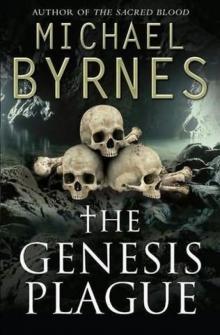 The Genesis Plague (2010)
The Genesis Plague (2010)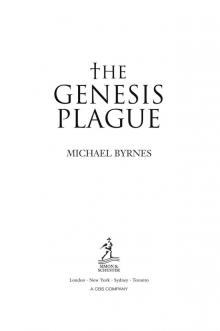 The Genesis Plague
The Genesis Plague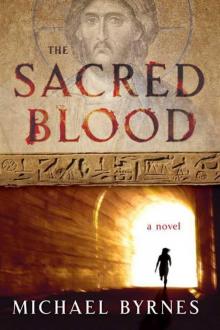 The Sacred Blood
The Sacred Blood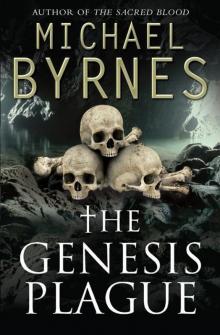 The Genesis Plague tf-1
The Genesis Plague tf-1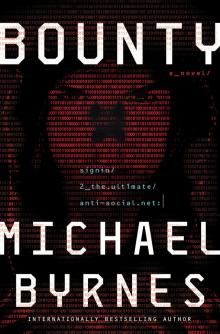 Bounty
Bounty Sacred Bones : A Novel
Sacred Bones : A Novel